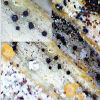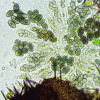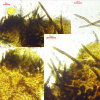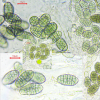
16-02-2026 18:34
 Thierry Blondelle
Thierry Blondelle
Bonjour,La micro de cet anamorphe de Hercospora su

08-12-2025 17:37
 Lothar Krieglsteiner
Lothar Krieglsteiner
20.6.25, on branch of Abies infected and thickened

16-02-2026 21:25
 Andreas Millinger
Andreas Millinger
Good evening,failed to find an idea for this fungu

16-02-2026 17:14
Joanne TaylorLast week we published the following paper where w

16-02-2026 16:53
Isabelle CharissouBonjour, quelqu'un pourrait-il me transmettre un

16-02-2026 11:53
Joeri Belisbetween leaf litter on twig in young salix growth.

14-02-2026 22:45
Hy!I would ask for some help determing this specie
Capronia muriformis?
Lothar Krieglsteiner,
04-08-2024 19:30
 French Alps, on Corylus, together with Orbilia trapeziformis, 25.6.24.
French Alps, on Corylus, together with Orbilia trapeziformis, 25.6.24.I would not hesitate if not the spores were partly bigger than allowed, up to about 35 µm long.
The rest seems to fit well - or doesn`t it?
Best regards, Lothar
Gernot Friebes,
12-08-2024 16:33
Re : Capronia muriformis?
I don't think it is C. muriformis based on the ascospore colour and septation pattern. Most spores seem to be shorter than 25 µm, is that correct? I suspect it belongs in the vicinity of C. chlorospora or C. "testudiformis" nom. prov. (https://drive.google.com/drive/folders/0B5SeyOEkxxZhOFBaNzZlaFIyYkk?resourcekey=0-NTIJo7LDBeDZhqQrrk8Utg). Barr also described some morphologically similar species from North America. This is a difficult and little-studied group, so it's not rare to find ambiguous collections...
Best wishes,
Gernot
Lothar Krieglsteiner,
12-08-2024 17:05

Re : Capronia muriformis?
Hello Gernot,
thank you very much for your reply. As I remember and wrote, I measured also spores distinctly longer than 25 µm.
I will compare chlorospora and testudiformis.
And yes: you are surely right that it is normal to find specimens that remain unclear.
Best regards, Lothar
thank you very much for your reply. As I remember and wrote, I measured also spores distinctly longer than 25 µm.
I will compare chlorospora and testudiformis.
And yes: you are surely right that it is normal to find specimens that remain unclear.
Best regards, Lothar
Luc Bailly,
12-08-2024 17:43
Re : Capronia muriformis?
Hello,
I've already noticed that spores that aren't dark brown yet but olive green aren't fully mature yet in all those species.
Cheers - Luc




